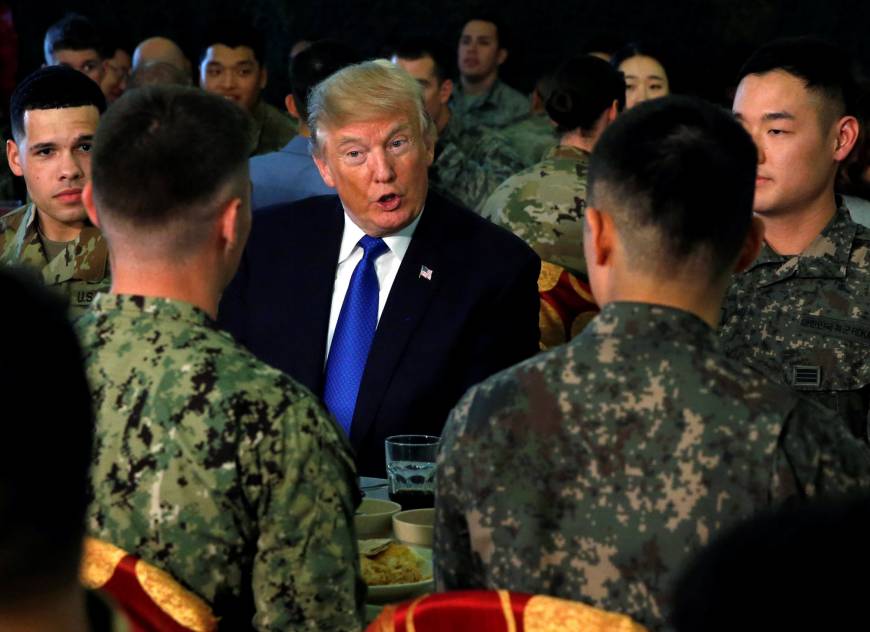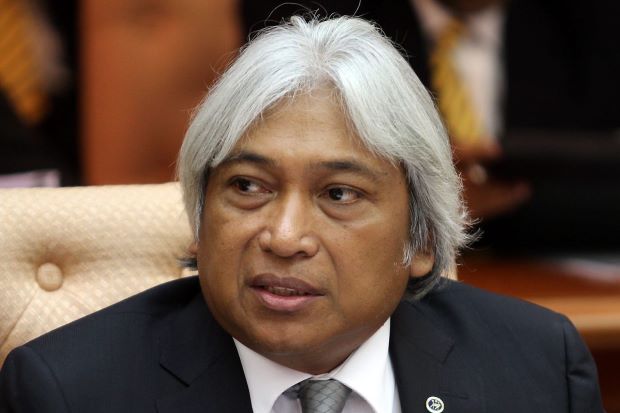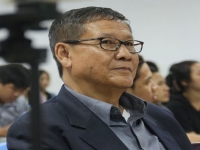May 31, 2018
Foreign Policy: The World Wants You to Think Like a Realist
From Europe to Iran to North Korea, the world doesn’t make sense anymore — unless you put all your illusions aside.
By Stephen M. Walt

Former US National Security Advisor Zbigniew Brzezinski and Former US Secretary of State Henry Kissinger are pictured at the Nobel Peace Prize Forum in Oslo December 11, 2016. (TERJE BENDIKSBY/AFP/Getty Images)
Trump has shown himself to be many things thus far — willful, vain, dishonest, impulsive, narcissistic, ignorant, etc. — but “rational” and “strategic” aren’t words that leap to mind when contemplating his foreign policy. Realism also emphasizes external factors, such as balances of power and geography, and downplays the role of individual leaders. But the Trump Presidency is an eloquent and worrisome reminder of the damage that individual leaders can do and especially when they are convinced that they are “
the only one that matters.”–Stephen M. Walt
One of the ironies of contemporary U.S. thinking about foreign policy is the odd status of realism. On the one hand, realist theory remains a staple of college teaching on international relations (along with many other approaches), and government officials often claim that their actions are based on some sort of “realist” approach. But Washington remains for the most part a realism-free zone, with few genuine realists in positions of influence. Moreover, the realist perspective is almost entirely absent from the commanding heights of U.S. punditry. This column, and the consistently insightful writings of people such as Paul Pillar or Jacob Heilbrunn, does not make up for realism’s exclusion from the New York Times, Washington Post, or Wall Street Journal.

Instead of relying on realism, both Republicans and Democrats tend to view foreign policy through the lens of liberal idealism. Rather than see world politics as an arena where security is scarce and major powers are forced to contend whether they wish to or not, America’s foreign-policy mavens are quick to divide the world into virtuous allies (usually democracies) and evil adversaries (always some sort of dictatorship) and to assume that when things go badly, it is because a wicked foreign leader (Saddam Hussein, Ali Khamenei, Vladimir Putin, Muammar al-Qaddafi, etc.) is greedy, aggressive, or irrational. When friendly states object to something the (virtuous) United States is doing, U.S. leaders tend to assume that critics just don’t understand their noble aims or are jealous of America’s success.

I’ll concede that the Trump Presidency presents a particular challenge for realists. It’s not easy to reconcile Donald Trump’s incoherent and bumbling approach to foreign affairs with the idea that states pursue national interests in a more or less rational or strategic fashion. Trump has shown himself to be many things thus far — willful, vain, dishonest, impulsive, narcissistic, ignorant, etc. — but “rational” and “strategic” aren’t words that leap to mind when contemplating his foreign policy. Realism also emphasizes external factors, such as balances of power and geography, and downplays the role of individual leaders. But the Trump Presidency is an eloquent and worrisome reminder of the damage that individual leaders can do and especially when they are convinced that they are “the only one that matters.
Nonetheless, Trump’s singular incompetence isn’t sufficient reason to toss realism aside completely. For one thing, realism still helps us understand how Trump can get away with all this meshugas: The United States is still so powerful and secure that it can do a lot of dumb things and suffer only modest losses. More importantly, realism remains an extremely useful guide to a lot of things that have happened in the recent past or that are happening today. And as Trump is proving weekly, leaders who ignore these insights inevitably make lots of dumb mistakes.
In short, it is still highly useful to think like a realist. Let me explain why. Realism has a long history and many variants, but its core rests on a straightforward set of ideas. As the name implies, realism tries to explain world politics as they really are, rather than describe how they ought to be. For realists, power is the centerpiece of political life: Although other factors sometimes play a role, the key to understanding politics lies in focusing on who has power and what they are doing with it. The Athenians’ infamous warning to the Melians captures this perfectly: “The strong do what they can, and the weak suffer what they must.” Quentin Tarantino couldn’t have put it any better.
For realists, states are the key actors in the international system. There is no central authority that can protect states from one another, so each state must rely upon its own resources and strategies to survive. Security is a perennial concern — even for powerful states — and states tend to worry a lot about who is weaker or stronger and what power trends appear to be. Cooperation is far from impossible in such a world — indeed, at times cooperating with others is essential to survival — but it is always somewhat fragile. Realists maintain that states will react to threats first by trying to “pass the buck” (i.e., getting someone else to deal with the emerging danger), and if that fails, they will try to balance against the threat, either by seeking allies or by building up their own capabilities.

Realism isn’t the only way to think about international affairs, of course, and there are a number of alternative perspectives and theories that can help us understand different aspects of the modern world. But if you do think like a realist — at least part of the time — many confusing aspects of world politics become easier to understand.
If you think like a realist, for example, you’ll understand why China’s rise is a critical event and likely to be a source of conflict with the United States (and others). In a world where states have to protect themselves, the two most powerful states will eye each other warily and compete to make sure that they don’t fall behind or become dangerously vulnerable to the other. Even when war is avoided, intense security competition is likely to result.
And by the way, thinking like a realist helps you understand why China is no longer committed to Deng Xiaoping’s policy of “peaceful rise.” That approach made sense when China was weaker, and it fooled plenty of Westerners into thinking China could be inveigled into being a responsible stakeholder that would meekly embrace various institutions and arrangements created by others back when China was weak. But realists understand that a more powerful China would eventually want to modify any features that were not in China’s interest, as Beijing has begun to do in recent years. Bottom line: Thinking like a realist is essential if you want to understand Sino-American relations.
If you think like a realist, you wouldn’t be surprised that the United States has repeatedly used military force in distant lands over the past 25 years and especially after 9/11. Why? For one simple reason: Nobody could prevent it. Americans were also convinced their global role was indispensable and that they had the right, the responsibility, and the wisdom to interfere all over the world. But America’s dominant position was the permissive condition that made this overweening ambition seem feasible, at least for a while. As Kenneth Waltz warned way back in 1993: “One may hope that America’s internal preoccupations will produce not an isolationist policy, which has become impossible, but a forbearance that will give other countries at long last the chance to deal with their own problems and make their own mistakes. But I would not bet on it.” Good realist that he was, Waltz understood that the “vice to which great powers easily succumb in a multipolar world is inattention; in a bipolar world, overreaction; in a unipolar world, overextension.” And that’s precisely what happened.
If you think like a realist, the crisis in Ukraine looks rather different than the typical Western version of events. Western accounts typically blame Putin for most of the trouble, but realists understand that major powers are always sensitive about their borders and are likely to react defensively if other great powers start encroaching on these regions. Ever heard of the Monroe Doctrine? In the case of Ukraine, the United States and its European allies had been expanding NATO steadily eastward (violating pledges made to Soviet leaders when Germany reunified) and ignoring repeated warnings from Moscow. By 2013, the United States and European Union were making a concerted effort to pull Ukraine into closer alignment with the West and openly interfering in Ukraine’s domestic political processes. Because the Obama administration did not think like realists, however, it was blindsided when Putin seized Crimea and derailed the EU/U.S. effort. Putin’s response was neither legal nor legitimate nor admirable, but it wasn’t surprising either. It is equally unsurprising that these events alarmed the Europeans and prompted NATO to shore up its defenses in Eastern Europe, precisely as a realist would expect.
Thinking like a realist can also help you understand why the EU is in trouble. The entire EU project was designed to transcend nationalism and subordinate state interests within broader supranational institutions. Its architects hoped the separate national identities and interests that had torn Europe apart repeatedly would fade over time and a broad pan-European identity would supplant them. European unity was facilitated by the Cold War because the Soviet threat gave Western Europe ample incentive to cooperate, gave the Soviets’ Eastern European satellites an ideal to aspire to, and kept the “American pacifier” on the continent. But once the Cold War was over, nationalism returned with a vengeance and especially after the euro crisis hit. Suddenly, populations wanted their elected officials not to save Europe but to save them. Despite herculean efforts by a number of European leaders and EU officials, these centrifugal tendencies seem to be getting worse, as the Brexit decision, the recent elections in Italy, and the resurgent nationalism in Poland and Hungary all attest. Those who hoped that European integration would prove irreversible have trouble understanding how their noble experiment went awry, but realists don’t.
If you think like a realist, you might not be quite so outraged by the support that Iran and Syria gave the anti-American insurgency in Iraq after 2003. You might not like it, but you wouldn’t find their conduct surprising. Their response was classic balance of power behavior because the United States had just overthrown Saddam Hussein and the Bush administration had made it clear that Syria and Iran were next on its hit list. It made good strategic sense for Damascus and Tehran to do whatever they could to keep the United States bogged down in Iraq so that Washington couldn’t reload the shotgun and come after them. Americans have every reason to be upset by what these states did, but if more U.S. officials thought like realists, they would have expected it from the get-go.
John Bolton’s Logic: War is Peace. He needs a new pair of glasses
And if you think like a realist, it is obvious why North Korea has gone to enormous lengths to acquire a nuclear deterrent and obvious why a country such as Iran was interested in becoming a latent nuclear weapons state as well. These states were deeply at odds with the world’s most powerful country, and prominent U.S. officials kept saying that the only solution was to topple these regimes and replace them with leaders more to their liking. Never mind that regime change rarely works as intended; the more important point is that any government facing a threat like that is going to try to protect itself.
Nuclear weapons aren’t good for blackmail or conquest, but they are a very effective way to deter more powerful states from trying to overthrow you with military force. And you’d think Americans would understand this, given that the U.S. government thinks it needs thousands of nuclear weapons in order to be secure, despite its favorable geographic position and overwhelming conventional superiority. If U.S. leaders think like that, is it any wonder that some weaker and more vulnerable powers conclude that having a few nukes might make them more secure? And is it so surprising that they might be reluctant to give them up in exchange for assurances or promises that might easily be reversed or withdrawn? Someone really should explain this logic to John Bolton.
Thinking like a realist also helps you understand why states with radically different political systems often act in surprisingly similar ways. To take an obvious example, the United States and Soviet Union could not have been more different in terms of their domestic orders, but their international behavior was much the same. Each led vast alliance networks, toppled governments they didn’t like, assassinated a number of foreign leaders, built tens of thousand of nuclear weapons (deployed on missiles, bombers, and submarines), intervened in far-flung lands, tried to convert other societies to their preferred ideology, and did what they could to bring the other down without blowing up the world. Why did they behave in such similar fashion? Because in an anarchic world, each had little choice but to compete with the other, lest it fall behind and become vulnerable to the other’s predations.
Last but not least, if you think like a realist, you’re likely to be skeptical about the ambitious schemes that idealists keep dreaming up to bring an end to conflict, injustice, inequality, and other bad things. Striving to build a safer and more peaceful world is admirable, but realism reminds us that the ambitious efforts to remake world politics always create unintended consequences and rarely deliver the promised results. It also reminds that even allies fear unchecked power and will have misgivings whenever the United States tries to run the world. If you think like a realist, in short, you are more likely to act with a degree of prudence, and you’ll be less likely to see opponents as purely evil (or see one’s own country as wholly virtuous) and less likely to embark on open-ended moral crusades. Ironically, if more people thought like realists, the prospects for peace would go up.

Stephen M. Walt is the Robert and Renée Belfer Professor of International Relations at Harvard University.

















